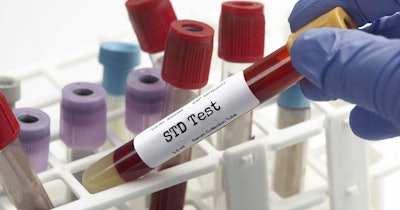
The U.K. National Institute of Health and Social Care Research (NIHR) is funding work on a point-of-care test for sexually transmitted infections.
In the U.K., it takes up to two weeks for patients to receive results for gonorrhea tests, unless the doctor can view the sample under a microscope and provide results straight away. People typically have to wait seven to 10 days to receive results from chlamydia tests. The World Health Organization (WHO) wants faster tests, noting that currently “follow-up can be impeded and care or treatment can be incomplete.”
University of Birmingham spinout Linear Diagnostics is developing a point-of-care test designed to show if a person is infected with chlamydia or gonorrhea in 20 minutes. The rapid test uses linear dichroism spectroscopy to detect genetic material from pathogens. Exploiting changes in fluid alignment, the test uses a beam of polarized light to detect multiple targets from a single sample. Researchers shared data on the approach in a paper published in the journal RSC Chemical Biology in 2020.
“The rapidity of the testing procedure is key, as patients prefer to get test results quickly and start treatment immediately,” Brendan Farrell, chairman of Linear, said in a statement. “We are aiming to produce a testing platform that will meet the WHO stipulations of being easy to use with minimal training, so people can present for testing and collect their treatment in a single visit.”
NIHR is supporting further development of the technology for the diagnosis of gonorrhea and chlamydia in men who have sex with men, and women who have sex with women. Linear said the funding will cover “essential work to optimize and validate” its platform technology “so it can diagnose infection from rectal and pharyngeal (throat) swabs.”
The NIHR database of research awards features one project involving Linear, namely a £50,000 ($62,000) grant that started in March. The abstract says Linear has “designed and tested a rapid isothermal DNA amplification assay that can detect chlamydia and gonorrhea from both male urine and female vaginal swab patient samples and give a result within 20 minutes at high levels of sensitivity and specificity.”
Linear has also built a “prototype cartridge rig,” according to the research award, and is using the project to “focus on overcoming a specific technical challenge associated with [its] disposable cartridge.” The abstract adds that pharyngeal and rectal swabs “have proven to be more difficult to test with high levels of accuracy.” The startup referenced the challenge of extracting DNA from the samples in its statement.



















